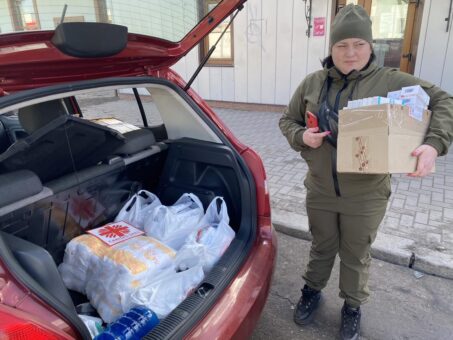
Mar 2, 2022 | Non categorizzato
Contributions collected by Focolare Movement Emergency Coordination through the non-governmental organisations Azione per un Mondo Unito (AMU) and Azione per Famiglie Nuove (AFN) will go to support assistance activities for the Ukrainian population carried out by Caritas-Spes Ukraine. The actions of war in Ukraine show no sign of stopping, and among the population there are thousands of displaced people fleeing. Many are trying to survive between homes and emergency shelters, where they can receive initial support. 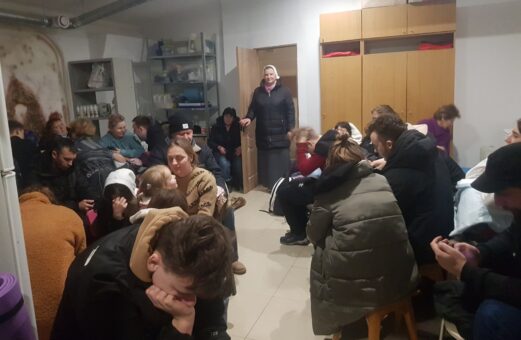 With contributions collected through the appeal launched by Focolare Movement Emergency Coordination, AMU and AFN are firstly supporting the actions of Caritas-Spes Ukraine. The organisation is providing aid to thousands of people forced to abandon their homes and flee to the border, or to take refuge in underground shelters set up in the immediate area where possible. Caritas-Spes Ukraine is committed to offer safe shelter, food, medicine, hygiene products and psychological support for close to 500 displaced mothers with children housed in their centres. More than 2,500 people are also receiving aid through Caritas in the parishes and 14 soup kitchens that remain active in the areas of Kiev, Lutsk, Berdiansk, Kamenets-Podolsky, Zhytomyr, Kharkiv, Lviv, Odessa, Vinnitsa and several cities of the Transcarpathia Region. The images of the war in Ukraine every day in international media, and the testimonies of our contacts on the ground, such as Mira Milavec, a Slovenian focolarina who lives in Ukraine and collaborates with Caritas-Spes, describe the state of emergency of a population under siege. The people are defenceless in the face of the bombing, and they crowd routes to reach the borders, or take refuge in basements or shelters, where makeshift beds have been set up as they wait for a hot meal, drinking water and electricity.
With contributions collected through the appeal launched by Focolare Movement Emergency Coordination, AMU and AFN are firstly supporting the actions of Caritas-Spes Ukraine. The organisation is providing aid to thousands of people forced to abandon their homes and flee to the border, or to take refuge in underground shelters set up in the immediate area where possible. Caritas-Spes Ukraine is committed to offer safe shelter, food, medicine, hygiene products and psychological support for close to 500 displaced mothers with children housed in their centres. More than 2,500 people are also receiving aid through Caritas in the parishes and 14 soup kitchens that remain active in the areas of Kiev, Lutsk, Berdiansk, Kamenets-Podolsky, Zhytomyr, Kharkiv, Lviv, Odessa, Vinnitsa and several cities of the Transcarpathia Region. The images of the war in Ukraine every day in international media, and the testimonies of our contacts on the ground, such as Mira Milavec, a Slovenian focolarina who lives in Ukraine and collaborates with Caritas-Spes, describe the state of emergency of a population under siege. The people are defenceless in the face of the bombing, and they crowd routes to reach the borders, or take refuge in basements or shelters, where makeshift beds have been set up as they wait for a hot meal, drinking water and electricity. 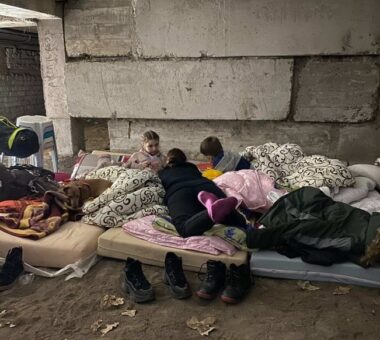 At the border with Poland, the line of desperate people who hope to cross the border is tens of kilometres long. Caritas-Spes in Lviv has organized special aid for mothers who try to escape with children, even very small ones, in their arms. They need everything, especially hot water to prepare meals or change diapers. In Odessa, which is under attack, shelters are being set up, even under the cathedral. The activity is punctuated by the sound of sirens announcing danger arriving or its temporary cease. In Vinnitsa a psychologist is organizing online training sessions for volunteers and operators about providing psychological help in stressful situations such as this. The first has already been attended by more than 120 people. Currently, the fundraising has already reached 100,000 euros, and the first shipment of funds has already been sent. It is being used to support the actions of Caritas-Spes for early aid to Ukrainian families.
At the border with Poland, the line of desperate people who hope to cross the border is tens of kilometres long. Caritas-Spes in Lviv has organized special aid for mothers who try to escape with children, even very small ones, in their arms. They need everything, especially hot water to prepare meals or change diapers. In Odessa, which is under attack, shelters are being set up, even under the cathedral. The activity is punctuated by the sound of sirens announcing danger arriving or its temporary cease. In Vinnitsa a psychologist is organizing online training sessions for volunteers and operators about providing psychological help in stressful situations such as this. The first has already been attended by more than 120 people. Currently, the fundraising has already reached 100,000 euros, and the first shipment of funds has already been sent. It is being used to support the actions of Caritas-Spes for early aid to Ukrainian families.  We are also evaluating the possibility of supporting the costs to take in the many Ukrainian refugees who are arriving in the surrounding countries, such as Slovakia and Poland. They are being welcomed by the generosity of local families who are opening their homes to them. Unfortunately, military activities show no signs of ceasing, and as confirmed by local contacts, needs will only increase. Frequent updates about the aid activity being carried out on the ground are available via the online and social channels of AMU and AFN. To support Ukraine and aid families devastated by the war, donate online on these sites: AMU: amu-it.eu/dona-online-3/ AFN: afnonlus.org/dona/ or through bank transfer to the following accounts: Action for a United World ONLUS (AMU) IBAN: IT 58 S 05018 03200 000011204344 at Banca Popolare Etica SWIFT/BIC: ETICIT22XXX Action for New Families ONLUS (AFN) IBAN: IT 92 J 05018 03200 000016978561 at Banca Popolare Etica SWIFT/BIC: ETICIT22XXX Reference: Ukraine Emergency
We are also evaluating the possibility of supporting the costs to take in the many Ukrainian refugees who are arriving in the surrounding countries, such as Slovakia and Poland. They are being welcomed by the generosity of local families who are opening their homes to them. Unfortunately, military activities show no signs of ceasing, and as confirmed by local contacts, needs will only increase. Frequent updates about the aid activity being carried out on the ground are available via the online and social channels of AMU and AFN. To support Ukraine and aid families devastated by the war, donate online on these sites: AMU: amu-it.eu/dona-online-3/ AFN: afnonlus.org/dona/ or through bank transfer to the following accounts: Action for a United World ONLUS (AMU) IBAN: IT 58 S 05018 03200 000011204344 at Banca Popolare Etica SWIFT/BIC: ETICIT22XXX Action for New Families ONLUS (AFN) IBAN: IT 92 J 05018 03200 000016978561 at Banca Popolare Etica SWIFT/BIC: ETICIT22XXX Reference: Ukraine Emergency
Mar 1, 2022 | Non categorizzato
Donatella Rafanelli told Maria Chiara Biagioni of the Italian news agency “SIR” about the life of the Focolare community in Ukraine in recent days. A 29-hour trip from Kiev. “Now our dream is to go back there”. A 29-hour drive out of Kyiv to reach Mukachevo, a town in the west of Ukraine. Heavy traffic on the roads, long queues at cash machines and petrol stations, tanks and people along the way asking for a lift. Donatella Rafanelli is a focolarina, from Pistoia in Italy, who has lived in a Focolare community in Kyiv since 2019. She spoke to “SIR” about that journey along the ‘route’ of internally displaced persons. Donatella told us, “We were in Kyiv when we received a phone call on Thursday morning advising us to pack quickly because there was shooting 70 kilometres from the capital. We didn’t know what to do because for all of us it was the first time that we were in that kind of situation. We went to look for the closest shelter to our house and were directed to an underground carpark. We went home and rang the Italian embassy on an emergency number. They told us to stay home and go to the shelter only if there was an alarm. Everything seemed normal. People had been talking about the possibility of an attack on Kyiv for days, but when it happened, the first thing we did was look each other in the eyes. We said, here we go, we’re at war. And we prayed. We asked Jesus to give us strength and to give us peace. From then on, it was all a race against time. We put a few things together in a small bag. We took very little, the bare essentials and personal documents. We tried to get train tickets so we could go to the west, but they were sold out. The airport was closed. So we decided to take the car. The roads out of Kyiv were blocked. There were very long queues at the bank to get money and at the supermarkets. It took a long time just to get out of the city. We stopped twice for petrol. At the first petrol station we queued for an hour. And while we were there, waiting, we heard the shots. It was an emotional moment. We stood still, in silence. When we set off again, you could see tanks and people hitchhiking for a lift. Our phones were constantly receiving and sending messages and calls: from those who had left, from who had decided to stay. We were sharing news and putting the people who were trying to leave in contact with the Focolare communities in Slovakia and Poland, who had offered a welcome. Only as we were travelling, did we realize what had happened to us. We weren’t in the car to go to an appointment or a trip. We were leaving a city, our home. We would never have wanted to leave. But we realized it was impossible to stay.” In Mukachevo, Donatella and her companions were welcomed by a Parish Priest and by the community of the Focolare there. “We are still in Ukraine; this is very important to us. We didn’t run away. We want to continue living in this country. We’ve been offered lots of places to go. The fact that we left Kyiv is just because it’s dangerous right now. There was no point in staying under the bombing. But now our dream is to go back there.” She continued, “War? It’s madness, no one has the right to take someone else’s life or rob them of the chance to live a normal life. People here have made a lot of sacrifices to buy a house, save money. And now with the war, their plans for the future are jeopardized, their dreams are shattered. We are praying that this madness will end as soon as possible. We are following the news of the talks between the delegations and of the efforts being made at the level of international diplomacy. I think the only thing that can help us is a miracle. It really helps us to hear all the news from people who pray for us and who demonstrate in the streets for peace. We need a miracle.”
Maria Chiara Biagioni
Mar 1, 2022 | Non categorizzato
The 2021-2023 Synod convened by Pope Francis is an opportunity to listen to and dialogue with others; a moment to rediscover the true identity of the Church, the “universality” from the beginning. The pathway involves all the dioceses of the world, including the Holy Land. “As we set out on this journey, we are more aware than ever that together, as disciples of Christ on this earth which is his home, we are all called to be his witnesses. Let us remember that his greatest desire is that we are one.” (cf. Jn 17). This is what we read in the letter of 26 January 2022 sent by the Catholic Ordinaries to the heads of the Christian Churches in the Holy Land regarding the 2021-23 Synod which has been convened by Pope Francis and is entitled “For a Synodal Church: communion, participation, mission”. Pierbattista Pizzaballa, the Latin Patriarch of Jerusalem, signed the letter which had the explicit aim of informing and involving brothers and sisters in various local ecclesial communities about the synodal journey that has begun in the Holy Land. He underlined the importance of listening to each other in order to grow closer together on this fraternal journey. Reference was made to the missionary nature of a “universal” Church, in Jerusalem, in particular. During a meeting held on 9 November 2021 after the opening of the Synodal Pathway, the Patriarch had spoken about this with the ecclesial movements and new communities present in the Holy Land. “Our Church, the Church of Jerusalem, began life in the Upper Room at Pentecost, and, even then, it was both local and universal (…) especially in recent years, it has been enriched by many more charisms. For this reason, your presence here is not only a gift and a sign of God’s providence (…), but it is also a contribution to the fulfilment of what God, the Lord, desires.” The participants all listened to each other and spoke of their own experiences. The valuable help of the Patriarch enabled them to better understand how to approach the Synod at a local level. Answering various questions, Mgr Pizzaballa shared his thoughts on synodality which “is a style – he said – a way of being, in the Church, but also outside the Church. It is an attitude. Listening and dialogue are expressions of this (…)”. The movements and new communities – says the Patriarch- need to work in “cross platforms”, going to the heart of the experience of “communion” of the universal Church, the experience that, more than others, seems really difficult to live in the Holy Land. “By communion I mean the awareness of belonging, of having freely received this gift, of having a life that is ‘inserted’ into other lives (…). All this stems from the experience of the encounter with Jesus. (…) after having met the Lord and experienced salvation, you understand that this experience becomes complete and profound, when it is shared in a community (…). This letter sent by the Catholic Ordinaries to the heads of the various Christian Churches in the Holy Land renewed a deep longing in many people and opened up new horizons by underlining the desire to grow in fraternity and be enriched by the wisdom of others. The hope of the Synodal Journey is that we should all experience ‘being together’ in the atmosphere similar to a shared meal where the group not only embraces suffering together but wants to immediately speak of the joys that life offers. It would be like the disciples’ journey to Emmaus. Although they were disappointed and sad, they walked together and, in communion, supported each other until the Risen Lord came to them. An opportunity not to be missed, to recognise him in our midst.
Maria Grazia Berretta
Feb 28, 2022 | Non categorizzato
Encountering the Gospel today means finding the living Word of God. Chiara Lubich, through her experience with the first community of the Movement in Trent, makes us appreciate the effects of putting the Gospel into practice. If God speaks to us, how can we not welcome his Word? In the Bible there are 1,153 instances when God repeats the invitation to listen to him. It is the same invitation that the Father extended to the disciples when the Word, his Son, came to live among us. He said: “Listen to him.”[1] The listening that the Bible speaks about, however, is done more with our hearts than with our ears. It means adhering completely to what God tells us, making it our own, obeying him with the same trust as children who abandon themselves into their mother’s arms, letting her carry them. … In this, we hear an echo of Jesus’ teaching when he calls blessed those who hear the Word of God and obey it, [2] and also when he acknowledges as his mother, his brothers and sisters, all those who hear his Word and put it into practice.[3] Jesus said that a person who listens well to the Word is the one who puts it into practice, thus giving a firm foundation to their life, like building a house on rock.[4] In every one of his Words, Jesus expresses all his love for us. Let’s incarnate his Word in our lives and make it our own. If we put it into practice, we will experience the enormous potential for life it brings forth both within in and around us. Let’s fall in love with the Gospel to the point of allowing it to transform us and overflow onto others. This is our way to love Jesus in return. It will no longer be we who live, but Christ will be formed in us. We will experience first-hand what it means to be freed from ourselves, from our limitations and all the things that tie us down. Moreover, we will see the revolution of love that Jesus, now free to live within us, will bring about in society around us. This was our experience at the beginning of the Movement in Trent, during World War II, when we often had to run to the air-raid shelters, taking with us only a small copy of the Gospels. We opened it and read it and, due to a particular grace of God, I believe, those words, which we had heard so many times before, shone out for us with a totally new light. These were Words of life, words that could be transformed into life. … We witnessed the growth of a living community around us, which after only a few months numbered some five hundred people. All this was the fruit of our living contact with the Word, which was constant, dynamic, moment by moment. We were “inebriated” with the Word; we could say that the Word lived us. We would ask one another: “Are you living the Word?” “Are you a living Word?” And that would be enough to increase our swiftness in living it. We should go back to living as we did then. The Gospel is always relevant. It’s up to us to believe in it and experience it.
Chiara Lubich
(Chiara Lubich, in Parole di Vita, [Words of Life] Città Nuova, 2017, pp. 789-791) [1] Mt 17:5. [2] See Lk 11:28. [3] See Lk 8:20-21. [4] See Mt 7:24.
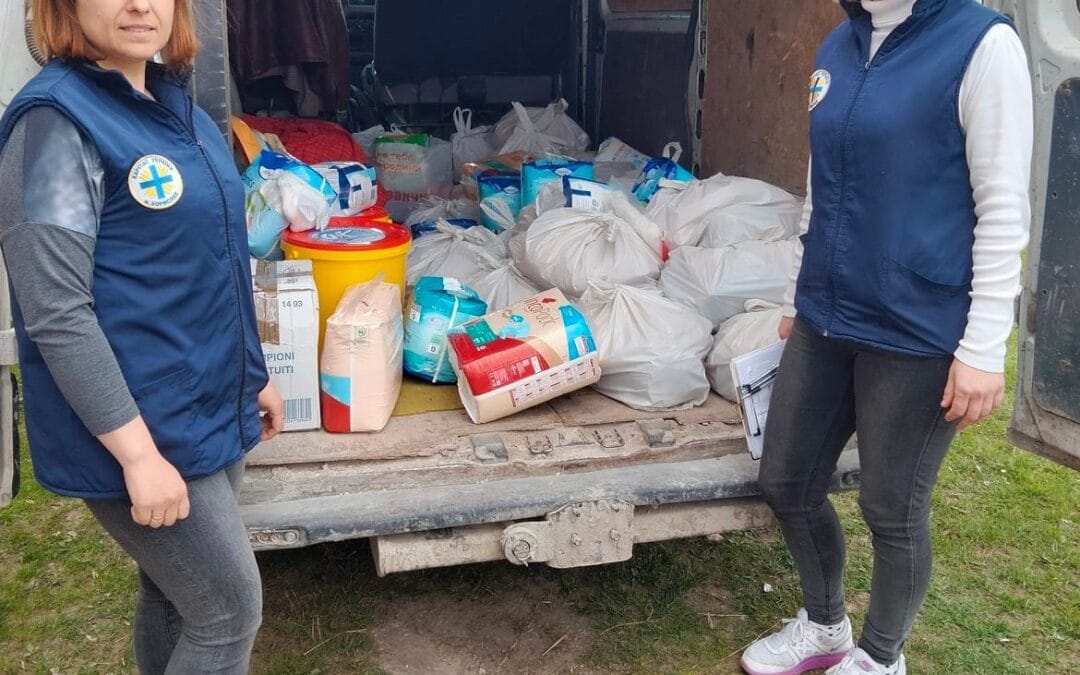
Feb 26, 2022 | Centro internazionale, Emergencies, Focolari nel Mondo, Non categorizzato
The contributions, collected through the NGOs Azione per un Mondo Unito (AMU) and Azione per Famiglie Nuove (AFN), will be used to provide the people of Ukraine with basic necessities, in collaboration with local Churches.
The Emergency Coordination Team of the Focolare Movement has launched a special fundraising campaign to support the people of Ukraine through the NGOs Azione per un Mondo Unito (AMU) and Azione per Famiglie Nuove (AFN).
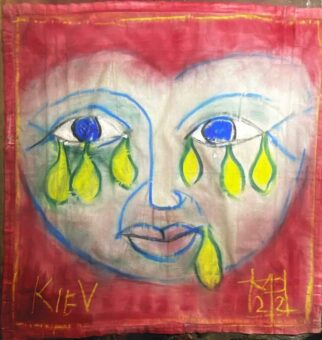
“Kiev” by the painter Michel Pochet
Any donations received will be managed jointly by AMU and AFN to provide essential aid to the Ukrainian people for food, medical care, housing, heating and shelter in various Ukrainian cities, in collaboration with local Churches. Donations can be made online via the following sites: AMU: www.amu-it.eu/dona-online-3/ AFN: www.afnonlus.org/dona/ or by bank transfer to the following accounts:
Action for a United World ONLUS (AMU) IBAN: IT 58 S 05018 03200 000011204344 at Banca Popolare Etica Codice SWIFT/BIC: ETICIT22XXX
Action for New Families ONLUS (AFN) IBAN: IT 92 J 05018 03200 000016978561 at Banca Popolare Etica Codice SWIFT/BIC: ETICIT22XXX
Reason for donation: Ukraine Emergency
Tax benefits are available on such donations in various EU countries and other countries around the world, according to different local regulations. Italian taxpayers should be able to obtain income tax deductions and allowances, in accordance with the relevant regulations of each NGO.
Feb 25, 2022 | Non categorizzato
Faced with the events that have been shaking the world for days, the Political Movement for Unity, which draws its inspiration from the experience and ideals of the Focolare Movement, affirms its common commitment to peace, which can only be achieved through concrete ‘doing’. “If you want peace, prepare for peace” are the words of Igino Giordani, a pacifist politician of the 20th century. Only a daily and multipronged peace effort can stop war. History has already declared too often that war is a crazy choice. The means of confrontation are outdated and open the way to greater insecurity, both locally and globally. Of this we are convinced, we politicians, officials, citizens and diplomats of the Politics for Unity Movement. From all over the world we express our closeness to the peoples suffering this tragic war, while we strongly support those who, in various capacities, continue to negotiate for peace, the only true solution. It is never too late to reopen negotiation and dialogue, in the short and long term. May the imperative of peace guide us. We single out these three main directions for commitment: 1 – Often the creation of nation states has not been a free choice of peoples, but the result of post-war negotiating tables, legacies of imperialisms. Old and new divisions call for a courageous political effort that gives new meaning to national identities, that challenges continental unions, first and foremost the European Union, beyond their immediate interests. 2- History teaches that economic sanctions leave governments unscathed and impoverish civil society, women, men and especially children. Syria is the latest, most serious example. The choice of sanctions must be pursued cautiously, so that it does not become part of the logic of war and power struggles. Politics must be able to control the arms and carbon industry circuits, and only in this way can true peace be built. 3- In the face of the resurgence of nuclear weapons and their strategic enhancement, today we appeal strongly to our governments to sign and implement the Treaty on the Prohibition of Nuclear Weapons, adopted by only 122 states on 7th July 2017. The political power of the UN must be brought back into action and the voice of governments must be integrated with the voice of the cities of the earth, gathered in a special world assembly, to give more strength to our peoples. In these times when the naked power of force seems to prevail, we do not hesitate to affirm that we still believe, and will always believe, in peacebuilding, in the processes of dialogue, in the tools of politics. It is the components of civil society, with the spiritual and cultural strength of their faiths, and with their many good practices, that will bring to light the great ideals that sustain history. May our representatives silence their weapons as soon as possible and listen to the women and men of peace.
Mario Bruno, president MPPU (Politics for Unity Movement)
Feb 24, 2022 | Non categorizzato
We hear from the Focolare communities, present in various cities of Ukraine. They invite us to join them in their worldwide prayer for peace every Thursday at 7.30 pm (Italian time). “In this terrible moment, we are sustained by the faith and love that we are receiving from all over the world through messages, telephone calls and prayers. We would like to thank each and every one. They give us strength and increase the hope that God will give us the gift, the miracle of peace”. With these words Donatella Rafanelli, an Italian focolarina and a teacher, who lives in the Kiev focolare, shared how the Focolare communities in Ukraine are living this frightening time. She continued, “In recent weeks, with the growing tension we felt we were living a truly special moment in our life, even if everyday life flowed as usual. By talking to the people around us, we realized how much fear, worry, sadness and disappointment there has been for months and which now, with the worsening of the situation in the last few hours, is even more accentuated”. She explained, “We too, as a community of the Movement, are certainly not immune from all this. We have wondered and continue to ask ourselves what to do in this situation. We are living this painful moment with everyone. We are aware that we cannot do extraordinary or special things, but we can listen to those around us sharing fears and concerns and try to understand, moment by moment, what is best to do “. Yesterday, Pope Francis invited everyone, believers and non-believers, to join in a choral plea for peace by praying and fasting, especially on 2nd March, the beginning of Lent. Together with him, other leaders of various Christian Churches are inviting people to pray to implore the gift of peace. In the Focolare Movement around the world, the time-out for peace continues every day (at 12:00 in each time zone). It is a moment of silence and prayer for peace in every corner of the globe. Donatella told us, “Here in Ukraine, every Thursday for a year now, at 7:30 pm (Italian time) we have a moment of prayer for peace, in Italian and Ukrainian, at this link We invite everyone to join us for this moment, which recently, has attracted many people from various countries of the world who have peace at heart”. The focolare in Ukraine opened in Kiev in May 2019. Some Focolare communities were already present in the country. People in Ukraine had heard of the charism of unity thanks to many members of the Movement from neighbouring nations who, through visits and various contacts, had introduced this spirituality to several cities. Today the members of the Focolare, of different ages and vocations, are present in Mukachevo, Uzhgorod, Storozhniza, Lviv, Kiev and surroundings.
Anna Lisa Innocenti
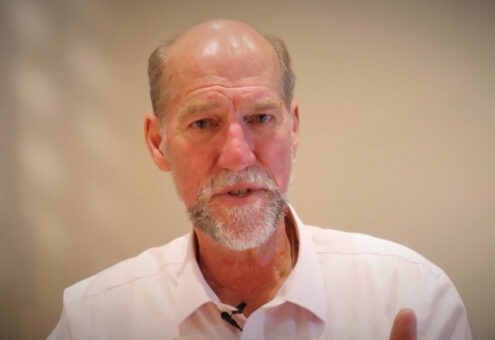
Feb 24, 2022 | Non categorizzato
The role of faith communities in limiting climate change and building the future is one of potential, yet humility. Martin Palmer discusses the Faith Plans programme, as well as Focolare’s role.  The United Nations Climate Change Conference (COP 26) in Glasgow concluded in November 2021. Martin Palmer, former Secretary General of the Alliance of Religions and Conservation and current CEO of FaithInvest, helps us uncover the potential that faith communities have in limiting climate change and the role that Focolare can play in this context. Martin is an international expert on major religious traditions and cultures, the author of more than 20 books on religious and environmental issues. He is a regular contributor to the BBC and is a lay preacher in the Church of England.
The United Nations Climate Change Conference (COP 26) in Glasgow concluded in November 2021. Martin Palmer, former Secretary General of the Alliance of Religions and Conservation and current CEO of FaithInvest, helps us uncover the potential that faith communities have in limiting climate change and the role that Focolare can play in this context. Martin is an international expert on major religious traditions and cultures, the author of more than 20 books on religious and environmental issues. He is a regular contributor to the BBC and is a lay preacher in the Church of England.
What is the specific role of faith communities in the face of such an unprecedented ecological crisis?
The great faiths are not only sources of ancient spiritual wisdom. They are also among the most important actors on the planet. Without the educational, medical, welfare and charitable work of faith communities through schools, hospitals, youth work, welfare agencies, etc., civil society would collapse in a matter of weeks. 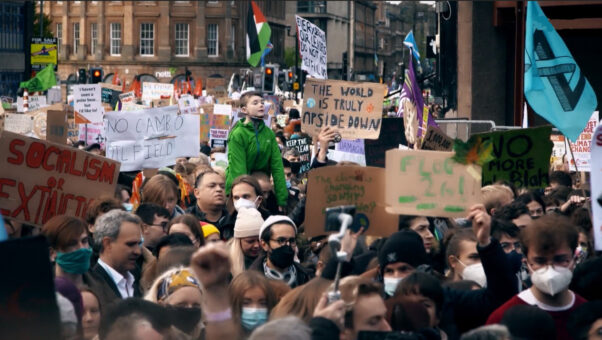 So while the spiritual aspect is vital because it gives us the broader perspective of time, space and meaning, if we ignore our role as stakeholders in building our future, we end up standing on the sidelines, shouting and hoping someone will listen.
So while the spiritual aspect is vital because it gives us the broader perspective of time, space and meaning, if we ignore our role as stakeholders in building our future, we end up standing on the sidelines, shouting and hoping someone will listen.
An active role for faith communities in driving change is important. Have you noticed a change in attitude in recent years?
I see a huge shift. For the first time, all the major religious environmental groups – like GreenFaith, Eco-Sikh, Daoist Ecological Temple Network, Hazon (the largest Jewish environmental group) and of course now the Vatican through the Laudato Si’ Movement and the Focolare – are working together side by side, bringing the wonderful pluralism of different beliefs, values and networks together, especially through the Faith Plans program.
In October 2021, on the feast of St. Francis of Assisi, Pope Francis and other religious leaders – including Archbishop of Canterbury Justin Welby and Ecumenical Patriarch of Constantinople Bartholomew – issued a call on climate change and a public commitment to create plans for the environment. Why is it important to make a plan?
For faiths to be truly effective, we need not only the wonderful words and wisdom drawn from the great spiritual currents, but we also need to know where they could be architects of change. That means knowing how extensive their role in education is in each place or country, how many clinics and hospitals they have, where their investments are, how much land they own, what range of professional expertise there is in the faith community and so on.
What do you see as the specific contribution of the Focolare in bringing about this ecological conversion?
The role of the Focolare is unique. Not only are you a large organization of laypeople in one of the most hierarchical faiths in the world, you are an inspiration that goes far beyond your members. For decades you have worked through the Economy of Communion on the life and work realities of faith in market practice. Creating new models and initiatives seems to come naturally to you. Your style of sharing what you do is an inspiration. You have decades of interfaith work and a depth and integrity not easily found in the often-superficial interfaith world. Your connections to other faiths show a joy in pluralism not often found in religious organisations of the scale and impact that the Focolare has. Finally, you seem to have already engaged some of the most charismatic, highly motivated, skilled and caring people in the world, who are already active.
Nino Puglisi for cittanuova.it
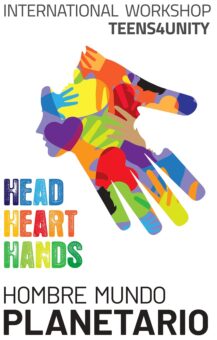
Feb 23, 2022 | Non categorizzato
From 25th to 27th February 2022, “Hombre Mundo”, a global project, conceived and implemented by young people as a way to reach universal fraternity, will take place. Local and global actions to foster knowledge between different cultures and religions, develop active citizenship, show the commitment of teenagers to overcoming the major challenges of the planet, from environment to the elimination of hunger and poverty. 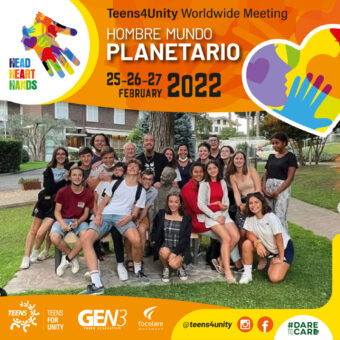 Claire Mulimbi, a Gen 3 (the 10 to 17 year olds of the Focolare Movement) who lives in the Democratic Republic of Congo, was one of the organizers of a two day “Hombre Mundo” event in September 2021. She said, “We understood that we have to accept each other, despite our differences, which can actually turn out to enrich us. It is a way to promote true values and ban false values. It was a very nice experience of sharing cultures through songs, dances, poems and guessing games. Experts came to teach us about ecology and then we planted some trees”. “Hombre Mundo” is a project that involves thousands of boys and girls of the Focolare Movement all over the world. The aim is to learn about universal brotherhood, getting to know young people of the same age from other cultures and religions, discovering and sharing the riches of each people, working together for the major challenges of the planet. But “Hombre Mundo” is not only an opportunity for getting to know one another, it is also based on concrete actions to develop active citizenship for the common good of the communities to which the teenagers belong or by twinning with others. “Hombre Mundo” therefore includes actions at local and global levels alongside international events, such as the one to be held from 25th-27th February 2022. The first “Hombre Mundo” workshop took place in 2014 in Argentina, then in 2017, three were held in Eastern Europe (in Croatia, Serbia and Poland): these were international “laboratory” type workshops, to get to know, love and respect the homeland of others as one’s own. The program is designed and carried out by the young people, from the choice of themes to be addressed to the experiences to be shared, to the lyrics of the songs. This edition should have had two central events, in Kenya and in Ivory Coast and many local events in many countries of the world. For the first time, however, due to the pandemic, it will be completely online . The internet was a great help in the preparation. Gašper Jošt, a Gen 3 from Slovenia said: “We split into smaller groups according to time zone and language. From Slovenia, we met up with Malta and Ireland. We wrote a song together. Miha wrote the lyrics and Anja wrote the melody. Through it, we want to encourage people to continue building a more beautiful world and to say that as long as there is even one person trying, they will encourage others and bring them hope”.
Claire Mulimbi, a Gen 3 (the 10 to 17 year olds of the Focolare Movement) who lives in the Democratic Republic of Congo, was one of the organizers of a two day “Hombre Mundo” event in September 2021. She said, “We understood that we have to accept each other, despite our differences, which can actually turn out to enrich us. It is a way to promote true values and ban false values. It was a very nice experience of sharing cultures through songs, dances, poems and guessing games. Experts came to teach us about ecology and then we planted some trees”. “Hombre Mundo” is a project that involves thousands of boys and girls of the Focolare Movement all over the world. The aim is to learn about universal brotherhood, getting to know young people of the same age from other cultures and religions, discovering and sharing the riches of each people, working together for the major challenges of the planet. But “Hombre Mundo” is not only an opportunity for getting to know one another, it is also based on concrete actions to develop active citizenship for the common good of the communities to which the teenagers belong or by twinning with others. “Hombre Mundo” therefore includes actions at local and global levels alongside international events, such as the one to be held from 25th-27th February 2022. The first “Hombre Mundo” workshop took place in 2014 in Argentina, then in 2017, three were held in Eastern Europe (in Croatia, Serbia and Poland): these were international “laboratory” type workshops, to get to know, love and respect the homeland of others as one’s own. The program is designed and carried out by the young people, from the choice of themes to be addressed to the experiences to be shared, to the lyrics of the songs. This edition should have had two central events, in Kenya and in Ivory Coast and many local events in many countries of the world. For the first time, however, due to the pandemic, it will be completely online . The internet was a great help in the preparation. Gašper Jošt, a Gen 3 from Slovenia said: “We split into smaller groups according to time zone and language. From Slovenia, we met up with Malta and Ireland. We wrote a song together. Miha wrote the lyrics and Anja wrote the melody. Through it, we want to encourage people to continue building a more beautiful world and to say that as long as there is even one person trying, they will encourage others and bring them hope”.  The Gen 3 from all over the world have also initiated various concrete actions in order to live out and spread a culture of giving and sharing. For example, useful educational material was sent to the young people of some countries of central-eastern Africa, Vietnam, Indonesia and Myanmar. In India, on the other hand, funds were allocated to prevent child labour, to build safe places where children can participate in activities to regain their self-esteem, socialize with others and develop their talents. Becoming more and more “world” men and women, that is people with a heart open to all humanity, with its riches and its challenges, is the goal of this year’s three days. Each day a theme will be explored. They will start from personal life and then broaden their gaze around the communities in which they live and then to the whole planet. February 25th will be dedicated to the lifestyle that characterizes these young people: the art of loving proposed by Chiara Lubich will be at the centre of their reflections and testimonies, with particular reference to the time in which we are living: how can we live it during the pandemic? How can we continue to love in the virtual world and social media? On the second day, the focus will be on integral ecology and the involvement of the Gen 3 for the “Zero Hunger” Goal, the second of the 17 United Nations Sustainable Development Goals for 2030. On the third day the title will be, “May all be one” and the attention will focus on the beauty of peoples coming together and their common commitment to build a world of peace and unity. Our two international bands will also participate in the 2022 “Hombre Mundo”. Gen Verde will give a percussion workshop that will involve 60 boys and girls from the inter-American region and Gen Rosso will give a concert for peace on 26th February at 12:30 (Italian time), live from the Italian island of Lampedusa, famous for welcoming migrants. Before the concert, at 12 noon (Greenwich Mean Time) there will be a worldwide link-up to pray, all together, for peace. Granville from Bangalore (India) told us, “Every person on planet Earth is endowed with aspects, faculties, abilities and skills that make them a unique work of art. Therefore, whenever we stand side by side, supported by a spirit of unity, we compose an amazing art gallery. What does “Hombre Mundo” mean to me? I believe one word perfectly answers this question: unity. There can be no unity without love. Love is the bridge over the abyss of division. Love breaks down the walls that fragment us and love unite us. It is only through love for my neighbour that I can do my part to create a world in which each of us, works of art, come together to create a synergistic art gallery”. For more information visit teen4unity.org
The Gen 3 from all over the world have also initiated various concrete actions in order to live out and spread a culture of giving and sharing. For example, useful educational material was sent to the young people of some countries of central-eastern Africa, Vietnam, Indonesia and Myanmar. In India, on the other hand, funds were allocated to prevent child labour, to build safe places where children can participate in activities to regain their self-esteem, socialize with others and develop their talents. Becoming more and more “world” men and women, that is people with a heart open to all humanity, with its riches and its challenges, is the goal of this year’s three days. Each day a theme will be explored. They will start from personal life and then broaden their gaze around the communities in which they live and then to the whole planet. February 25th will be dedicated to the lifestyle that characterizes these young people: the art of loving proposed by Chiara Lubich will be at the centre of their reflections and testimonies, with particular reference to the time in which we are living: how can we live it during the pandemic? How can we continue to love in the virtual world and social media? On the second day, the focus will be on integral ecology and the involvement of the Gen 3 for the “Zero Hunger” Goal, the second of the 17 United Nations Sustainable Development Goals for 2030. On the third day the title will be, “May all be one” and the attention will focus on the beauty of peoples coming together and their common commitment to build a world of peace and unity. Our two international bands will also participate in the 2022 “Hombre Mundo”. Gen Verde will give a percussion workshop that will involve 60 boys and girls from the inter-American region and Gen Rosso will give a concert for peace on 26th February at 12:30 (Italian time), live from the Italian island of Lampedusa, famous for welcoming migrants. Before the concert, at 12 noon (Greenwich Mean Time) there will be a worldwide link-up to pray, all together, for peace. Granville from Bangalore (India) told us, “Every person on planet Earth is endowed with aspects, faculties, abilities and skills that make them a unique work of art. Therefore, whenever we stand side by side, supported by a spirit of unity, we compose an amazing art gallery. What does “Hombre Mundo” mean to me? I believe one word perfectly answers this question: unity. There can be no unity without love. Love is the bridge over the abyss of division. Love breaks down the walls that fragment us and love unite us. It is only through love for my neighbour that I can do my part to create a world in which each of us, works of art, come together to create a synergistic art gallery”. For more information visit teen4unity.org
Lorenzo Russo
Feb 21, 2022 | Non categorizzato
The words of Chiara Lubich on which we reflect today are remarkably topical and will not leave us indifferent. They will surely lead us to look around and act for the benefit of all our brothers and sisters. … During his life on earth, Jesus always welcomed everyone, especially those who were outcasts, those most in need, or who were furthest away. Jesus’s love conveyed his trust, confidence and friendship to everyone, breaking down, one by one, the barriers of pride and selfishness that had been built up in the society of his time. Jesus was the visible sign of the perfect, welcoming love that the heavenly Father has for each one of us, and of the love which, as a result, we should have for one another. This is what the Father wants first from us. That is why we can render no greater glory to God than by trying to welcome each other in the same way as Jesus welcomed us. (…) Our attention is drawn to one of the aspects of selfishness that is most common and, let’s admit it, most difficult to uproot. It is the tendency to isolate ourselves, to discriminate against and exclude others who are different and who could disturb our tranquillity. Let us try, first of all within our families, associations, communities and working groups, to get rid of our tendency to judge others, discriminate, be prejudiced, hold resentments or be intolerant towards one neighbour or another. These attitudes are common and easy to fall into, but they have a damaging and chilling effect on human relationships. They block the flow of mutual love. Then, let us do the same in society around us, bearing witness to the welcoming love of Jesus with any neighbour the Lord puts next to us – especially with those whom our collective social selfishness tends to exclude or marginalise. The act of welcoming others who are different from ourselves lies at the very basis of Christian love. It is the starting point, the first step to take in building a civilization of love and fostering the culture of sharing that Jesus is calling us to especially today.
Chiara Lubich
(Chiara Lubich, in Parole di Vita, [Words of Life] Città Nuova, 2017, pag. 512-514)

 With contributions collected through the appeal launched by Focolare Movement Emergency Coordination, AMU and AFN are firstly supporting the actions of Caritas-Spes Ukraine. The organisation is providing aid to thousands of people forced to abandon their homes and flee to the border, or to take refuge in underground shelters set up in the immediate area where possible. Caritas-Spes Ukraine is committed to offer safe shelter, food, medicine, hygiene products and psychological support for close to 500 displaced mothers with children housed in their centres. More than 2,500 people are also receiving aid through Caritas in the parishes and 14 soup kitchens that remain active in the areas of Kiev, Lutsk, Berdiansk, Kamenets-Podolsky, Zhytomyr, Kharkiv, Lviv, Odessa, Vinnitsa and several cities of the Transcarpathia Region. The images of the war in Ukraine every day in international media, and the testimonies of our contacts on the ground, such as Mira Milavec, a Slovenian focolarina who lives in Ukraine and collaborates with Caritas-Spes, describe the state of emergency of a population under siege. The people are defenceless in the face of the bombing, and they crowd routes to reach the borders, or take refuge in basements or shelters, where makeshift beds have been set up as they wait for a hot meal, drinking water and electricity.
With contributions collected through the appeal launched by Focolare Movement Emergency Coordination, AMU and AFN are firstly supporting the actions of Caritas-Spes Ukraine. The organisation is providing aid to thousands of people forced to abandon their homes and flee to the border, or to take refuge in underground shelters set up in the immediate area where possible. Caritas-Spes Ukraine is committed to offer safe shelter, food, medicine, hygiene products and psychological support for close to 500 displaced mothers with children housed in their centres. More than 2,500 people are also receiving aid through Caritas in the parishes and 14 soup kitchens that remain active in the areas of Kiev, Lutsk, Berdiansk, Kamenets-Podolsky, Zhytomyr, Kharkiv, Lviv, Odessa, Vinnitsa and several cities of the Transcarpathia Region. The images of the war in Ukraine every day in international media, and the testimonies of our contacts on the ground, such as Mira Milavec, a Slovenian focolarina who lives in Ukraine and collaborates with Caritas-Spes, describe the state of emergency of a population under siege. The people are defenceless in the face of the bombing, and they crowd routes to reach the borders, or take refuge in basements or shelters, where makeshift beds have been set up as they wait for a hot meal, drinking water and electricity.  At the border with Poland, the line of desperate people who hope to cross the border is tens of kilometres long. Caritas-Spes in Lviv has organized special aid for mothers who try to escape with children, even very small ones, in their arms. They need everything, especially hot water to prepare meals or change diapers. In Odessa, which is under attack, shelters are being set up, even under the cathedral. The activity is punctuated by the sound of sirens announcing danger arriving or its temporary cease. In Vinnitsa a psychologist is organizing online training sessions for volunteers and operators about providing psychological help in stressful situations such as this. The first has already been attended by more than 120 people. Currently, the fundraising has already reached 100,000 euros, and the first shipment of funds has already been sent. It is being used to support the actions of Caritas-Spes for early aid to Ukrainian families.
At the border with Poland, the line of desperate people who hope to cross the border is tens of kilometres long. Caritas-Spes in Lviv has organized special aid for mothers who try to escape with children, even very small ones, in their arms. They need everything, especially hot water to prepare meals or change diapers. In Odessa, which is under attack, shelters are being set up, even under the cathedral. The activity is punctuated by the sound of sirens announcing danger arriving or its temporary cease. In Vinnitsa a psychologist is organizing online training sessions for volunteers and operators about providing psychological help in stressful situations such as this. The first has already been attended by more than 120 people. Currently, the fundraising has already reached 100,000 euros, and the first shipment of funds has already been sent. It is being used to support the actions of Caritas-Spes for early aid to Ukrainian families.  We are also evaluating the possibility of supporting the costs to take in the many Ukrainian refugees who are arriving in the surrounding countries, such as Slovakia and Poland. They are being welcomed by the generosity of local families who are opening their homes to them. Unfortunately, military activities show no signs of ceasing, and as confirmed by local contacts, needs will only increase. Frequent updates about the aid activity being carried out on the ground are available via the online and social channels of AMU and AFN. To support Ukraine and aid families devastated by the war, donate online on these sites: AMU: amu-it.eu/dona-online-3/ AFN: afnonlus.org/dona/ or through bank transfer to the following accounts: Action for a United World ONLUS (AMU) IBAN: IT 58 S 05018 03200 000011204344 at Banca Popolare Etica SWIFT/BIC: ETICIT22XXX Action for New Families ONLUS (AFN) IBAN: IT 92 J 05018 03200 000016978561 at Banca Popolare Etica SWIFT/BIC: ETICIT22XXX Reference: Ukraine Emergency
We are also evaluating the possibility of supporting the costs to take in the many Ukrainian refugees who are arriving in the surrounding countries, such as Slovakia and Poland. They are being welcomed by the generosity of local families who are opening their homes to them. Unfortunately, military activities show no signs of ceasing, and as confirmed by local contacts, needs will only increase. Frequent updates about the aid activity being carried out on the ground are available via the online and social channels of AMU and AFN. To support Ukraine and aid families devastated by the war, donate online on these sites: AMU: amu-it.eu/dona-online-3/ AFN: afnonlus.org/dona/ or through bank transfer to the following accounts: Action for a United World ONLUS (AMU) IBAN: IT 58 S 05018 03200 000011204344 at Banca Popolare Etica SWIFT/BIC: ETICIT22XXX Action for New Families ONLUS (AFN) IBAN: IT 92 J 05018 03200 000016978561 at Banca Popolare Etica SWIFT/BIC: ETICIT22XXX Reference: Ukraine Emergency



 So while the spiritual aspect is vital because it gives us the broader perspective of time, space and meaning, if we ignore our role as stakeholders in building our future, we end up standing on the sidelines, shouting and hoping someone will listen.
So while the spiritual aspect is vital because it gives us the broader perspective of time, space and meaning, if we ignore our role as stakeholders in building our future, we end up standing on the sidelines, shouting and hoping someone will listen. 
